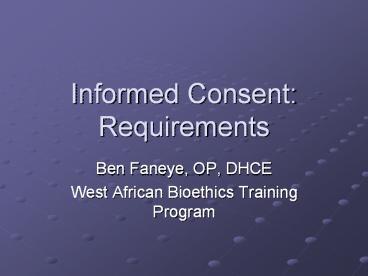Informed Consent: Requirements PowerPoint PPT Presentation
1 / 24
Title: Informed Consent: Requirements
1
Informed ConsentRequirements
- Ben Faneye, OP, DHCE
- West African Bioethics Training Program
2
Informed Consent
- What is it?
- A process by which a person authorizes medical
treatment or care once a provider has disclosed
information regarding the nature, benefits and
risks of treatment - Emphasis on informed consent as a process, not an
isolated act
3
Informed Consent
- What is it?
- It is a particular kind of action by individual
patients and subjects an autonomous
authorization - Emphasis on the patient/subjects exercise of
autonomy, which is an authorization done without
any external interference - A subjects right which prevails . . .
4
Elements of Informed Consent
- A. Information Disclosure
- Nuremberg code states that the subject must have
sufficient knowledge - This obliges the investigator to furnish human
subjects such information as nature, duration,
purpose, method/means to be used, inconveniences
risks that could be reasonably expected
5
Information Disclosure
- Merely presenting information does not mean
subject gives consent freely - Disclosure should empower subjects by helping
overcome obstacles to choice - Empowerment enhances right to self-determination
6
Freedom of Choice
- It is subjects right, which imposes duty on
researcher to disclose. Its ensures that - Subject has legal capacity to consent
- Situated as to exercise power of choice freely
(from fraud, deceit, force, etc.) - Have sufficient comprehension to aid an
enlightened decision - Have sufficient knowledge to base decision on
7
Subjects Rights
- Could investigator hold back information for
subjects good? - Real concern should be on respecting subjects
legally protected rights - therapeutic privilege is an exception only in
clinical instances, not in research
8
Subjects Rights
- Subjects have rights to exercise autonomy without
interference, which means that - Investigators duty not to constitute hindrance
or interference - By giving pertinent information to subjects
(complete Vs. substantial)
9
Elements of Informed Consent
- B. Competence
- Legal term indicating ability to perform a task,
e.g., making a decision - Only an autonomous, i.e., competent person, can
give informed consent - It is a continuum concept, ranging from full
competence to full incompetence
10
Competence
- Threshold concept
- A minimum limit above which a subject is deemed
competent, and below which incompetence is
declared - Questions peculiar to a study in relation to
subjects well-being could be posed in
determining such boundary
11
Competence
- For the competent person, the will power serves
as the source of authorization or refusal. An
expression of ones rights - Social criteria of determining competence
considers age, experience, maturity,
responsibility welfare
12
Competence
- Task/decision specific
- Not a one-shot determination, which underscores
informed consent as a process
13
Competence
- When subject is deemed incompetent, a proxy
consent is allowed but no more than minimal risk
to subject allowed - Standard followed
- Reasonable person standard
- Best interest judgment standard
14
Competence Determination
- Reasonable outcome of choice paternalistic in
approach - Ability to understand facts presented during the
consent process - Rational capacity to apply information to ones
situation - An understanding of oneself being invited to be a
subject and its implications
15
Elements of Informed Consent
- C. Comprehension
- Focuses on subjects understanding
- Subjects competence partly depends on
understanding - No understanding, no intentionality
- Autonomous authorization requires sufficient
understanding
16
Comprehension
- Subjects understanding cannot be ascertained
merely by asking do you understand? - Focus questions rather on the information given,
which concerns the particular research study - Understanding to be determined by how subject
relates to specific information given
17
Comprehension
- Its object
- Risks of study, real potential
- Benefits
- Procedure to be used
- Duration
- Purpose (therapeutic???)
18
Comprehension
- Standard requirement?
- Substantial understanding, or
- Full understanding
- Substantial understanding understands not only
what one is authorizing, but essentially that it
is the self issuing the authorization - Underscores subjects exercise of autonomy
19
Elements of Informed Consent
- D. Voluntariness
- Focuses on influences which impair the subjects
right of self-determination - Such influences could be manipulative or coercive
- Subject acts voluntarily only when he/she acts
free of others influence
20
Voluntariness
- Essence of Voluntary action
- Individually willing an action
- Act of will follows from self-intention
- Intention flows from understanding of information
21
Voluntariness
- Acting voluntarily means acting solely on your
own initiative, free from fear, force, violence,
ignorance, etc - Consent that is given by a competent subject
involuntarily is invalid an indication of
coercion - Such violates Nurembergs intent in stressing
voluntary consent.
22
Voluntariness
- Influences on Voluntariness
- A. Coercion
- Intention to control anothers will
- By presenting what amounts to an irresistible
threat - B. Manipulation
- Intentional and successful control of another
through the alteration of choices
23
Voluntariness
- Certain populations of people highly dependent
cannot give voluntary consent, e.g., prisoners,
psychiatric pts, other institutionalized
persons (dependency compromises autonomy) - Patients under physicians care
- Old/poor people?
24
Recap
- Informed consent underscores the subjects right
of self-determination, without which the person
loses ones dignity - In light of the Nigerian Factor, what measures
could investigators take to ensure subjects give
not only informed, but voluntary consent?

